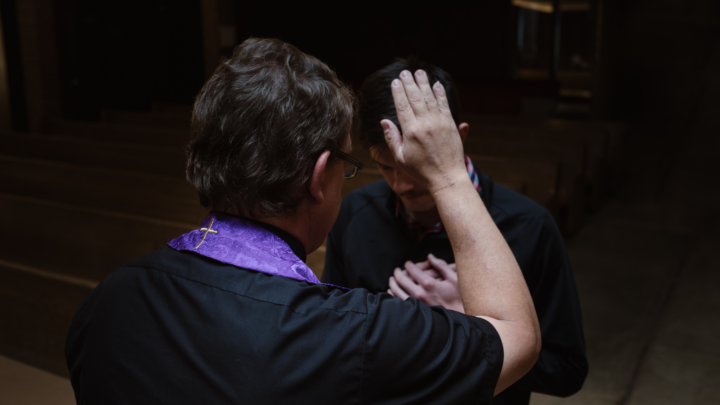Have you experienced a nudging thought convincing you that you forgot to confess a particular sin? Have you kept on confessing the same sins multiple times a day or a week? Or have you been confused about receiving Communion because you were unsure if you were in a state of grace or not?
These were what I felt when I was severely struggling with scrupulosity. The feeling of being unsatisfied because God might have not completely forgiven me in the Sacrament of Reconciliation.
What is Scrupulosity?
Scrupulosity is a Religious Obsessive-Compulsive Disorder in which a sufferer is excessively fearful of offending God.
Obsession
In 2015, a friend of mine asked me questions about Catholicism. It caught me off guard because I was not that aware of the foundation of my faith. All I knew was that I was trying my best to attend Mass every Sunday. Because of that, I began searching. I came across apologetics and profoundly studied the Church. Little by little, I started to practice my Catholic faith. I immersed myself in the teachings and traditions of the Church. I took my religion seriously.
Every year, I made a random commitment to grow closer to God by means of engaging in Church activities and doing small penances. In 2016, I listened to and recorded the homily each week. The following year, I left my habitual sin for over 10 years. Last 2018, I attended all the Sunday Masses without any misses. And in 2019, I promised myself to receive the Eucharist every single week. Little did I know that the latter would vastly trigger my tendency to be obsessed with certain things.
Before Sunday, I always made sure that I confessed my sins to cleanse the guilt of the unworthy reception of communion. At first, it was an easy routine, until it became a rule that I meticulously follow. I was too careful about not breaking it to the point that I experienced going to confession twice a day and six times a week with similar sins I had in mind.
This tainted my view of my faith, especially when it comes to sins.
It was paralyzing.
I became sensitive to my actions. It was difficult for me to define mortal and venial sins. I needed to evaluate things assiduously before making a move or else I would be so guilty and end up inside a confession box.
RELATED– Prayer Journal for Scrupulous
Compulsion
This catholic guilt extended to my devotions. My daily rosary took me almost an hour to finish because of intrusive thoughts– random disturbing thoughts that suddenly enter one’s mind.
I was scared that my Novena to Our Mother of Perpetual Help and my devotion to the Sacred Heart of Jesus were not efficacious because I might be in a state of mortal sin. I repeated the 3 o’clock prayer and The Angelus afraid of not following my usual routine before reciting it.
The worst part, I developed a compulsion.
I prayed the Act of Contrition whenever I thought I sinned prolonging everything I did.
I also became superstitious, believing that the last thing I thought (which was usually bad) would happen to me or my loved ones if I would not stop sinning. The worse part was that I was not even sure if I was transgressing or not.
My compulsion and my superstition combined made things much terrible. When negative thoughts registered in my mind, they triggered my worry that I had to perform my compulsion over and over again until it was gone.
I could not function well.
It affected my work and my relationship with my family and friends. I was depressed the whole time. It was as if God was always checking on me for my faults.
What made me more stressed out was when I felt I was alone with this disorder because admit it or not, religious OCD is something rarely being attended to. Very few figure out that they have it.
In my case, it was my inquisitiveness that led me to know my real situation.
I read several blogs, signed up in a forum, and joined groups.
Collectively, the advice was to get a spiritual director.
I tried contacting people for help but it was not easy. Since it was almost December at that time, priests were busy and all I could do was wait while enduring the crippling effect of this doubting disease.
It was painful witnessing how people you love worried about you without knowing the reason why. I just could not divulge what I was feeling of the fear of being judged.
Solution
While waiting for a spiritual director, I realized that this was not the first time I got an obsession.
My experience with the recitation of the Holy Rosary was an obsession. Due to intrusive thoughts, I repeatedly said the prayer just to get it right and perfect. I wanted it to be effective that my criteria were to pray it with exact words as indicated on the pamphlet and without any disturbing thoughts.
It exhausted me. It discouraged me to pray. I beat myself up. I was so down because I kept on wondering what was wrong with me.
Drained, I told myself, this got to stop. I opened my laptop and started searching for my condition. After spending some time browsing, I figured out that I was not alone in the battle, there are also other people who are struggling with scrupulosity. Even saints suffered from it too.
Blog after blog, I came across content that changed my perception regarding my vain perfectionism. It helped me reject my doubts and trust in God more.
When my mind suggested negative ideas, I disregarded them. When blasphemous and lustful thoughts entered my consciousness, I shunned them.
Eventually, I recovered. I got my life back to normal.
There were still intrusive thoughts from time to time, but I could manage them.
From this experience, I realized and concluded that exposure is the key.
When blasphemous thoughts bothered me, I ignored them. When I had doubts about whether I said this prayer or not, I never repeated it and continued. I consistently did it every time I prayed until I got used to it.
Exposure
A new year was coming, and I thought, it might be the best time to break my obsession again. I prepared for it. Whenever I was doubtful and anxious about doing something, I reminded myself of the 9th Commandment for the Scrupulous by Scrupulous Anonymous.
“When you are doubtful, you shall assume that the act of commission or omission you’re in doubt about is not sinful, and you shall proceed without dread of sin.”
I tried my best to get exposed to it. I broke my fears one at a time until I gradually move on from my dark past. It was not simple because as an OCD individual, I despise change. I want things to be in order, so deviating from my normal stresses me. It took me months and tons of effort to finally partially recuperate.
The commandment also aids scrupulous persons to organize their thoughts and confess only grave sins, since distinguishing mortal from venial sins is difficult for them. Their exposure signals them that a particular action or inaction is not sinning, therefore, minimizing the possibility of confessing the same sins again and again.
Another commandment that helped me to crush my blasphemous and lustful thoughts is the 5th Commandment.
“You shall not worry about powerful and vivid thoughts, desires, and imaginings involving sex and religion unless you deliberately generate them for the purpose of offending God.”
This pushed me to build confidence in my intention. Remember that regardless of how thoughts and images are salacious and provocative, scrupulous individuals worry about offending God, and so, there is no way that they intentionally think of these horrid ideas.
According to the Catechism of the Catholic Church,
For a sin to be mortal, three conditions must be present.
CCC 1857 “Mortal sin is sin whose object is grave matter and which is also committed with full knowledge and deliberate consent.”
There were times that after going to confession, I turned to be too cautious about thinking random things because they might be awful enough to persuade me to not receive the communion.
But then, I realized that the more I despise dreadful thoughts, the more they enter and pollute my brain.
When this happens, those who are scrupulous have a great chance to doubt their guilt and go for confession again.
This is where trusting one’s intention could help. Ask yourself this question, did I deliberately think of it?
If you are still hesitant, follow the 2nd Commandment of Scrupulous Anonymous.
“You shall confess only sins that are clear and certain.”
Spiritual Direction
For those who already have a spiritual director who is normally a priest, follow his advice. It might be hard at times, but remember that he is ordained by the Church that Christ has founded, enveloped by the Holy Spirit. Consider him as your guide in breaking free from the disorder. Open up your triggers. Share all your fears. Trust him.
As the 7th Commandment for the Scrupulous suggests.
“You shall obey your confessor when he tells you never to repeat a general confession of sins already confessed to him or another confessor.”
If you are still looking for a Spiritual Director, you can check this guide.
For a quick Confession Guide for Scrupulous, click here.
Conclusion
In conclusion, healing from scrupulosity takes time, courage, and trust.
Those who are struggling with it need patience, for exposure takes time.
They also must decide to pick themselves up and be willing to change, because improvement starts with a decision to want it.
Lastly, they have to trust in God’s mercy and His representatives here on earth, for it is in humility and docility that we allow the grace of God to work in us.
“But God, who is rich in mercy, because of the great love he had for us, even when we were dead in our transgressions, brought us to life with Christ (by grace you have been saved), raised us up with him, and seated us with him in the heavens in Christ Jesus, that in the ages to come he might show the immeasurable riches of his grace in his kindness to us in Christ Jesus.”
– St. Paul (Ephesians 2:4-7)
For helpful resources for scrupulosity, click here.
St. Dymphna, pray for us.


Rose Gagliano
Thank you for this post! Its so incredible to hear another account of what I also struggle with! There is hope! God bless! Scrupulosity is simply just a cross that can sanctify! Use it to search for God’s immense love.
nicoleandrewmata
Thanks Rose! Let’s continue to offer this cross for Him. God bless!
Nicole
I’m grateful for being able to find this website, especially this particular post. I’m currently struggling with scrupulosity real bad, especially this 2022 Lenten season. Unfortunately, I’m currently feeling the overwhelming burned out feeling. Nevertheless, I hope to get in a much better state after reading a few more tips from you and the resources you’ve mentioned. Please pray for me.
nicoleandrewmata
Thank you so much for dropping by! Praying that everything is well for you now. 🙂